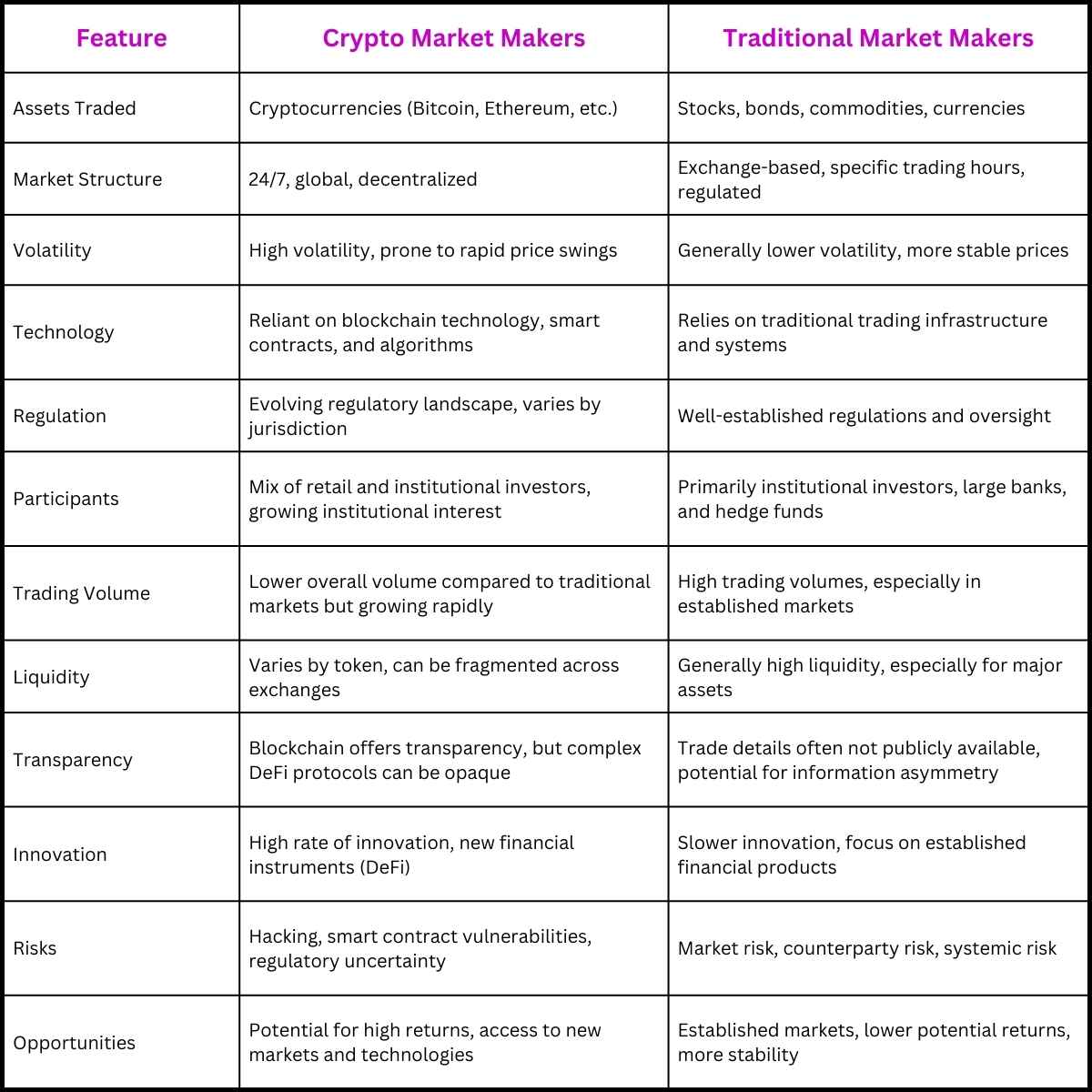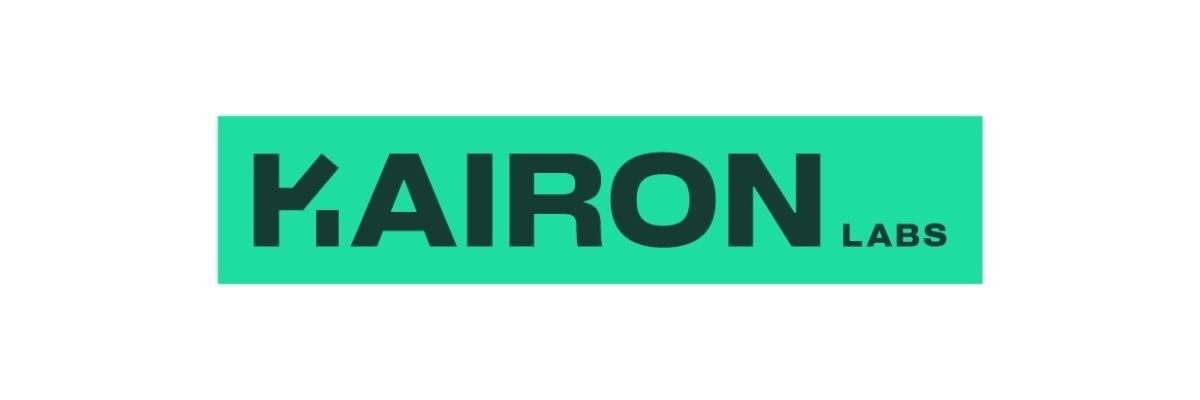As is the case with the traditional markets, crypto markets also require liquidity for them to operate effectively. This is where crypto market makers come into the picture. They are the ones who counteract buyers with sellers or take the other side of every trade. Absent market makers, engagement with the buying or selling of tokens in the real world, more so in high quantities, is irreconcilable
Trends in Crypto Market Making
The crypto world is in a state of constant change, which in this case includes market making. As we travel through 2026, however, a few trends are emerging determining the way in which market makers are conducting business. The emergence of Decentralized Finance (DeFi) has launched a new type of professional monitors who address the needs of on-chain liquidity markets. In addition, we also observe a trend towards hybrid models that combine conventional market making with algorithms that are better suited to the dynamics of the cryptocurrency markets.

Benefits for Businesses
A business planning to enter crypto, needs to develop a favorable crypto market for its tokens with support and liquidity. This will mean that they can offer a plethora of services in partnership with professional market makers in 2024. The market makers help to self-launch the tokens with enough liquidity even to satisfy the institutional investors and are therefore key to the success of any project. They help in easing drastic changes in prices and even prevention of losses from slippage, these are well received especially during customers with large volumes undertaking their share trading activities.
Technical Aspects of Crypto Market Making in 2024
The basic principles of the provision of market making services are likely to change in 2024. Heuristic methods and advanced characteristics of the distributed data approach, most of which are automated and algorithm- geared, are expected. These tools are enhancing the operations of market makers in that they are able to respond to the changes within market’s scope expeditiously, thereby achieving best possible prices for their clients. Global OTC liquidity, impressive risk management, and knowledge of DeFi are features of new-generation crypto market makers.
The realm of cryptocurrency is a very vibrant and unpredictable domain. Given its complexities it is easily understandable that both projects and traders need some constant market makers. While the standings will probably change next year, these firms are positioned to be key players in 2024 in the market:
10 Best Crypto Market Makers in 2024
Crypto market makers are essential for a healthy and functioning digital asset market. They provide liquidity, facilitate trading, and help stabilize prices. These top firms offer a range of expertise and services to support crypto projects in achieving their financial goals.
1. TokenMinds

Market Sectors and Instruments Traded: DeFi, NFTs, metaverse, stablecoins, altcoins
Market Making Capabilities: High volume order books with tight spreads, native integrations with DeFi protocols, broad token coverage and data-powered market making
Pros: Powerful DeFi Track Record, Broad Token Support and are Innovative.
Cons: Trading only; not as experienced with smaller projects, high fees for low-volume trading
TokenMinds is a DeFi-centric market maker and Web3 consultancy leader. Our infrastructure provides deep liquidity, broad token support, and smooth integration with DeFi ecosystems. We use our proven data-driven strategy to provide a more efficient & effective market making for crypto assets across the board. In addition to market making, TokenMinds offers consultation services from Web3 experts in tokenomics, NFT strategy and blockchain development.
2. Jump Crypto

Market Sectors and Instruments Traded: Bitcoin, Ethereum, for the most part the top 20 alternatives market and stablecoin directly.
Market Making Capabilities: Powerful reputation in reliability and security, deep risk management experience, ability to scale seamlessly to support larger trading volumes, institutional-grade services
Pros: Good reputation, strong risk management, high volume of trades crypto trading
Cons: Traditional asset choice, greater potential costs on riskier projects
Jump Crypto, which specializes in market making for institutions and places a great deal of importance on security and compliance. These are experts in managing high trade volume and providing secure market making service.
3. GSR Markets

Market Sectors and Instruments Traded: Cryptocurrencies, including DeFi tokens and NFTs, options, futures and other structured products
Market Making Capabilities: Complemented by experience in the cryptocurrency and traditional financial industries, provides managed custom services and structured products
Pros: For Complex projects, access to Structured products
Cons: Perhaps less nimble than pure cryptonatives, structured products may not make sense for all projects
With experience in traditional finance and the crypto market, GSR Markets offer a one-of-a-kind approach to market making. Including bespoke solutions and white label products, created for more complex projects looking to bridge the old with the new in a tailored fashion.
4. B2C2

Markets sector and instruments traded: Bitcoin, Ethereum, major altcoins, stable coins and other liquid crypto assets
Pros: Best for large trades, personalized service, great reputation
Cons: Less suitable for smaller projects, less focus on public exchange liquidity.
A veteran cryptocurrency market maker in the industry. B2C2 has access to a variety of liquid and over-the-counter markets from a constantly expanding partner network focusing on institutional clients and high-net-worth individuals.
5. Alameda Research

Market Sectors and Instruments Traded: A wide variety of digital assets, ranging from emerging tokens to DeFi tokens, and tokens with arbitrage opportunities
Market Making Strengths: Willingness to bear risk on riskier tokens, potential for innovative and aggressive strategies, strong track record before the recent events
Pros: May bear the risk others won't, potential for high returns, seasoned team
Cons: Uncertain future for the company, volatility could be increased by aggressive tactics, emphasis on security and compliance is downplayed.
Alameda Research is famous for its aggressive trading strategies and the fact that it is willing to support emerging and higher risk tokens. But recent events have put in doubt the company's long-term stability.
6. Cumberland DRW

Market Sectors and Instruments Traded: Bitcoin, Ethereum, major altcoins, stablecoins, tokenized assets
Market Making Strengths: Track record of handling high trading volumes, strong focus on security and regulatory compliance, potential ties to traditional finance investors, expertise in serving institutional clients
Pros: High-volume capacity, security focus, potential for institutional investment
Cons: May be less responsive to smaller projects, potential for higher fees
Cumberland DRW is a well-established market maker with a strong focus on security and compliance. They cater to institutional clients and have a proven track record of handling high trading volumes.
7. Amber Group

Market Sectors and Instruments Traded: Wide range of crypto assets, with a focus on tokens popular in the Asia-Pacific region
Market Making Strengths: Strong presence in the Asia-Pacific region, potential for cross-promotion with other services, may have regional regulatory advantages
Pros: Geographic reach, potential for synergies with other services, regional expertise
Cons: Broader focus may mean less specialized market making expertise, potentially higher costs for smaller projects
Amber Group offers a diverse range of crypto financial services, including market making, with a particular focus on the Asia-Pacific region. Their regional expertise and diverse service offerings can be advantageous for certain projects.
8. Folkvang

Market Sectors and Instruments Traded: Mid-cap tokens, DeFi tokens, and tokens traded on decentralized exchanges
Market Making Strengths: Niche focus on mid-cap tokens, strong understanding of DeFi and DEXs, algorithmic trading strategies that adapt to market conditions
Pros: Ideal for mid-cap tokens, DeFi expertise, adaptive trading strategies
Cons: May not be suitable for very large or small-cap tokens, less likely to offer personalized service
Folkvang specializes in providing liquidity for mid-cap tokens, with a strong focus on DeFi protocols and decentralized exchanges. Their algorithmic trading strategies adapt to changing market conditions, ensuring efficient and effective market making.
9. Kairon Labs

Market Sectors and Instruments Traded: DeFi tokens, stablecoins, and other tokens traded on decentralized exchanges
Market Making Strengths: Deep understanding of the DeFi landscape, expertise in automated market making for DEXs, innovative strategies tailored to on-chain liquidity
Pros: Ideal for DeFi projects, innovative on-chain liquidity solutions, strong technical expertise
Cons: Less focus on traditional centralized exchanges, DeFi expertise may not be relevant for all projects
Kairon Labs is a specialized market maker focused on DeFi protocols and decentralized exchanges. They offer innovative on-chain liquidity solutions and possess deep expertise in automated market making.
10. Genesis Trading

Market Sectors and Instruments Traded: Wide range of crypto assets, including Bitcoin, Ethereum, major altcoins, and stablecoins
Market Making Strengths: Established reputation in the crypto market, potential for synergies with other offerings, likely to have significant capital for handling large volumes
Pros: Wide range of services, established reputation, high-volume capacity
Cons: Market making may not be their primary focus, recent financial difficulties raise concerns
Genesis Trading is a well-established player in the crypto market, offering a variety of financial services, including market making. They have a strong reputation and the capacity to handle large trading volumes, but their broader focus may mean that market making is not their top priority.
Frequently Asked Questions (FAQs)
Although market makers are necessary for the healthy function of the crypto ecosystem, businesses frequently have queries about their functions and costs. How do businesses become their market maker? What are the common expenses? What are the risks associated with market makers? These are only some of the common questions provided in this section, which assists and gives an understanding to businesses seeking to work with market makers.
Conclusion
In the rapidly changing environment of cryptocurrencies, liquidity remains the core. This liquidity is provided by market makers, and they are essential to the proper execution of trades. With current trends and appropriate technical knowhow coupled with engaging reputable market makers like TokenMinds, Companies will be able to embrace the opportunities and navigate through the challenges of the exciting but turbulent crypto markets in 2024 and the years beyond.








